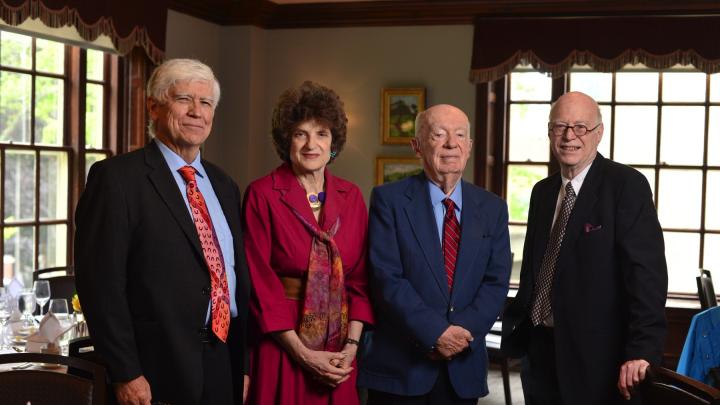The Graduate School of Arts and Sciences Centennial Medal, first awarded in 1989 on the occasion of the school’s hundredth anniversary, honors alumni who have made contributions to society that emerged from their graduate study at Harvard. It is the highest honor the Graduate School bestows, and awardees include some of Harvard’s most accomplished alumni. The 2017 recipients are:
Russell A. Mittermeier, Ph.D. ’77, Anthropology
Russell Mittermeier has held leadership positions at the World Wildlife Fund, the International Union for Conservation of Nature, and Conservation International, where he was president from 1989 to 2014, and where he now serves as executive vice chair. In those roles, Mittermeier has been instrumental in explaining the importance of “biodiversity hotspots,” and has helped to build widespread recognition that global conservation strategy should give the very highest priority to protecting these unique locations with large numbers of plant and animal species. In 1999, Time called Mittermeier and four others it featured on the magazine’s cover, “heroes for the planet.”
As a prolific field researcher specializing in both primatology and herpetology (Mittermeier is an associate in herpetology in Harvard’s Museum of Comparative Zoology), he has discovered seven new species of monkey—along with four lemurs and three turtles—and has had eight species named in his honor.
Edward Wilson, Pellegrino University Professor Emeritus in the Museum of Comparative Zoology, describes Mittermeier as “a pioneer in global conservation,” who as “a leader of Conservation International and through his extraordinary work around the world in real-life conservation projects” is “at the forefront of our current effort to save global biodiversity.”
Sarah P. Morris, Ph.D. ’81, Classical Archaeology, The Classics
Sarah Morris, Ph.D. ’81, is the Steinmetz Professor of classical archaeology and material culture at the University of California, Los Angeles. She has served as chair of the Department of Classics and as chair of an interdepartmental Ph.D. program at UCLA’s Cotsen Institute of Archaeology.
In 1993, she won the Archaeological Institute of America’s James R. Wiseman Book Award for Daidalos and the Origins of Greek Art, which draws on archaeology, linguistics, and philology to show that Near Eastern culture had a profound influence on ancient Greek artistic and literary traditions.
Gregory Nagy, Jones Professor of classical Greek literature and professor of comparative literature, describes Morris as “a brilliant communicator” who is able to share “her deep knowledge of archaeology with experts and non-experts alike.”
Thomas F. Pettigrew, Ph.D. ’56, Social Psychology, Psychology, and Social Relations
Thomas Pettigrew is a research professor of social psychology emeritus at the University of California, Santa Cruz. During his career, which included two decades of teaching at Harvard, he focused especially on issues of racism, discrimination, and prejudice.
In 1964, The Harvard Crimson described his course on racial prejudice as “the academic stronghold of the Harvard civil rights movement.” In the 1960s and 1970s, Pettigrew testified before Congress and gave expert testimony in several court cases on public-school desegregation. In recent years, he has focused on contact theory, the idea that increased contact between different groups—black and white, straight and gay, deaf or hearing—can build positive intergroup relations.
Lawrence Bobo, W.E.B. Du Bois professor of the social sciences, says Pettigrew “never loses sight of a commitment to social justice—a commitment to shedding light on how we can move toward a world that is free from the damaging effects to individuals, to communities, to whole nations, that result from prejudice and racism. His work is always tethered to speaking to those large challenges, and to the ways in which social science can inform efforts to make the world better.”
Richard Sennett, Ph.D. ’69, History of American Civilization
Richard Sennett is University Professor of the humanities at New York University, where he founded The New York Institute for the Humanities, and professor emeritus of sociology at the London School of Economics and Political Science. He is a sociologist and historian, and an advisor to UNESCO; he is also a musician (trained at The Juilliard School) and a novelist. His scholarship has focused on fundamental questions of modern life, such as what it means to live in a city, and what it means to work.
Sennett is the author of many books, including The Corrosion of Character, which Studs Terkel called “a devastating and wholly necessary book.” It examines the expendability of workers in modern capitalism as a form of oppression. Sennett’s The Fall of Public Man, was one of the first books to document declining involvement in political life during the past two centuries.
Werner Sollors, Cabot research professor of English literature and professor of African and African American studies describes Sennett as “extraordinarily attuned to aesthetics and art, as well as deeply engaged with social inequality and the changing world of global labor relations.” Many scholars, he added, “would be proud to have worked in just one of the many areas” where Sennett has made distinguished contributions.
Read the full Centennial Medal Citations, shared at a lunch in the medalists’ honor on the day before Commencement.








